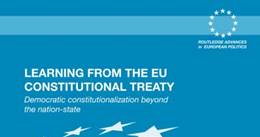

The negative results of referenda on the European Union (EU) Constitutional Treaty in France and the Netherlands, and subsequent low-key adoption of the Treaty of Lisbon raise complex questions about the possible democratization of international organisations. A study provides a full analysis of the EU Constitutional Treaty process, grounded in broader political theoretical debates about democratic constitutionalisation and globalization.
As international organizations become permanent systems of governance that directly interfere in individuals’ lives, it is not enough to have them legitimated by the consent of governments alone. A study presents an evaluation of the present EU Treaty of Lisbon in comparison with the original EU Constitutional Treaty, and analyses the importance of consent of the people, asking if saving the treaty came at the cost of democracy. Drawing first-hand on the European Convention and the referendum in the Netherlands, the study outlines an original political theory of democratic constitutionalisation beyond the nation-state, and argues that international organizations can be put on democratic foundations, but only by properly engaging national political structures.
International organisations like the EU should be put on a stronger democratic footing, through a set of rules, or a constitution, that would allow them to convert their power over the people into power by the people. This is the main conclusion of a study by the Free University of Amsterdam, which was presented at CEPS on December 5th.